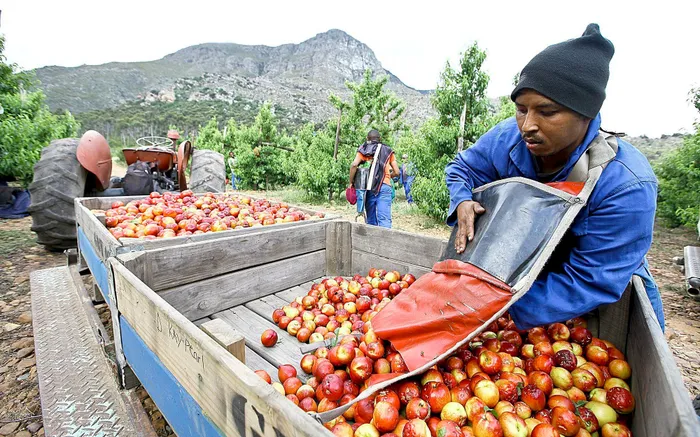
Minister of Agriculture John Steenhuisen announced that the department had signed a historic stone fruit trade protocol on Wednesday. Steenhuisen said that the Chinese market could unlock approximately R400 million for the agriculture industry over the next five years
Image: File THOMAS HOLDER
South Africa’s fruit industry is celebrating a major breakthrough after the Department of Agriculture signed a historic stone fruit trade protocol with China, opening the Asian market for five key fruit types — apricots, peaches, nectarines, plums, and prunes — for the first time.
The landmark deal not only enhances trade ties between South Africa and China, but also signals a new phase in agricultural diplomacy — one that promises to boost farmer incomes, create jobs, and strengthen the country’s role as a leading global fruit exporter.
Announcing the deal on Wednesday, Agriculture Minister John Steenhuisen said the agreement could unlock approximately R400 million for the sector over the next five years, with export earnings expected to double within a decade.
Steenhuisen said that the protocol marks “a major breakthrough for South African fruit producers and exporters at a time when diversification is essential for the country’s agricultural resilience.”
“We are of the view that the inaugural 2025/26 export season can generate approximately R28 million and R54m in 2026/27,” Steenhuisen said.
According to the department, this is the first time China has negotiated access for multiple stone fruit varieties from a single country under one deal. Projections indicate that exports to China are set to grow to 5% of total export volumes in 2032/2033.
South African apples gained entry to the Chinese market 10 years ago, and the pear protocol was signed in 2021, following approval by the Chinese Minister of the General Administration of Customs (GACC).
“Opening the Chinese market would allow South African producers to export more of their harvests at more sustainable prices. Stronger demand in China, together with a slight reduction in exports to other markets, are expected to drive market growth,” Steenhuisen said.
Industry body Hortgro, which represents South Africa’s deciduous fruit sector, hailed the agreement as a “game-changer” for producers.
Jacques du Preez, Hortgro's general manager for trade and markets, said orchards and packhouses have already been registered with the Department of Agriculture in anticipation of market access.
“We look forward to establishing much closer, mutually beneficial working relationships with the Chinese authorities to expedite market access between the two countries in shorter timeframes in future. We can’t wait to ship our first container of delicious, ethically produced stone fruit that complies with the strictest food safety standards to China,” Du Preez said.
Experts have welcomed the deal as a strategic step in diversifying South Africa’s trade portfolio amid shifting global dynamics.
International relations expert Dr Noluthando Phungula from UKZN said that the tariff increases against BRICS nations were likely to negatively impact global trade, economic stability, and supply chains globally.
“In South Africa, various industries will be hit the most visibly, being produced, with devastating cost consequences for producers and farms. The opening of Chinese markets can offset the challenging situation SA finds itself in following the expiration of Agoa and the proposed increased tariff,” she said.
“This new trade deal marks an important milestone in terms of Pretoria’s ability to lead dialogue on diversifying trade away from the US.”
Professor Waldo Krugell, an economist at North-West University, agreed, saying the move demonstrates how government diplomacy can open markets that the private sector cannot access alone.
“The private sector cannot open a door like this, but with such a protocol in place, this becomes a realistic export opportunity. There is still a lot of work for exporters to do to develop the new market, but the protocol will make a major difference,” Krugell said.
Professor Bonke Dumisa, an independent economist, said that any new market was worth pursuing in filling the gaps that may be caused by the end of the Agoa agreement.
BUSINESS REPORT